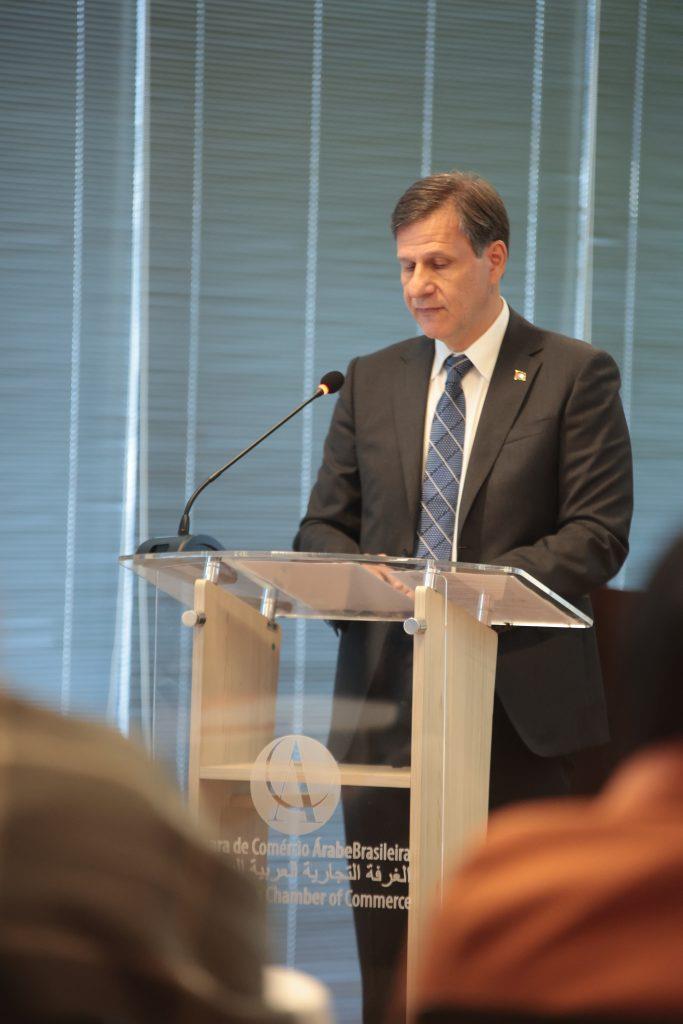
Maritime Routes Strained By Brazil-Arab Trade
In a panel moderated by the ABCC's board member Suzana Chohfi, Rodrigo Pestana, Senior Market Manager at the Danish shipping company Maersk , said that establishing a direct route is difficult because Brazil primarily exports refrigerated container cargo to the Arab Gulf countries. From there, it imports oil and fertilizers via tankers and bulk carriers, which are different types of vessel. In other words, the same ship cannot carry goods both ways because the vessels required for transporting the products are different.

Mohamad Orra Mourad, Secretary-General of the Arab-Brazilian Chamber, opened the event with its members
Pestana said that from 2021 to 2024, trade between Brazil and the Gulf countries grew by approximately 20% within the company's business, but the type of cargo transported remained stable-around 66% refrigerated and 33% dry.“There has to be diversification. In May this year, there was a case of avian flu that led to a drop in chicken exports [refrigerated cargo], which was not replaced. It's necessary to try to balance between dry and refrigerated cargo,” he said.
The solution companies have found to manage the trade route between Brazil and the Gulf countries is to use transshipment ports. These hubs receive the cargo, load it onto another ship, and send it to its final destination. For example, Maersk ships Brazilian refrigerated cargo from Paranaguá, Paraná state, or Itapoá, Santa Catarina state, to Tangier, Morocco, where the cargo is transferred to a vessel bound for its destination in the Gulf.
The current average transit time from Brazil to the Gulf is 35 days, but instabilities in the Red Sea region lead companies to seek longer routes, which can increase transit time by up to 28 days.
According to data from Brazil's Ministry of Development, Industry, Trade, and Services compiled by the ABCC, in 2024 Brazil exported USD 23.6 billion to the 22 Arab countries, mainly in sugar, poultry, iron ore, and corn, and imported USD 10.1 billion, primarily in oil and derivatives and fertilizers. To the Gulf countries, Brazil exported USD 11.1 billion, especially in poultry, sugar, iron ore, and beef, and imported USD 6.2 billion, mainly in oil and derivatives and fertilizers.
According to data presented by the ABCC's Market Intelligence Manager, Marcus Vinicius, 76% of Brazil's exports to Arab countries are agribusiness products, while 82% of imports from the region consist of oil and fertilizers. Maritime transport accounts for 97% of the total cargo, and air transport for 3%.
Daniela Zicari Di Monte, Logistics Director at DP World , a Dubai-based logistics integrator, said the company has been investing in digitalization and seeking alternatives to make container movement more efficient. She said that the port in the Jebel Ali Free Zone is a strategic hub for the company.“We don't focus so much on ship symmetry, but rather on maximizing trade exchanges and products,” she said.
Higor Goller, Logistics Manager at BRF , said the company exports 60,000 metric tons per month of halal products to Arab countries, and that logistics is a challenge.“Our factories are designed to distribute products, not to store them,” he said. He noted that there is currently a high concentration of containers in port yards and that there is little available space to expand these yards and improve distribution.
All attendees at the meeting mentioned that the punctuality of vessel arrivals and departures is crucial for exporting and importing, and that in many cases companies choose to depart from a port without fully loading the ship to avoid delays at subsequent stops. The global punctuality rate, Monte said, is 65%. In Brazil, it is 51%. On its route between Santos and Tangier, Pestana said, Maersk achieves 86%.
The ABCC's Market Intelligence Manager gave a brief presentation and said that export volumes, diversification of the export portfolio, and freight costs are currently the main challenges to establishing a maritime route.“When these are overcome, a direct route could exist,” he said.
After the event, Suzana Chohfi said the panel highlighted the importance of ensuring that products reach the recipient, even amid challenges.“It's not just about selling-it's about being able to deliver on time,” she said.
Mohamad Orra Mourad, Vice President of International Relations & Secretary-General of the ABCC, said at the opening of the event that ports and maritime routes in Arab countries, such as the port of Tangier and the Suez Canal in Egypt, offer companies the opportunity to reach more destinations for their products beyond the Arab countries themselves.“Harmonizing the flow is essential to balance trade,” he said. Also in attendance at the meeting were ABCC's statutory directors William Atui, Sami Roumieh, and Arthur Jafet.
Read more:
New markets could redefine Brazil's exports
Translated by Guilherme Miranda
Marcelo Brammer/Arab-Brazilian ChamberSupplied/Arab-Brazilian ChamberThe post Maritime routes strained by Brazil-Arab trade appeared first on ANBA News Agency .
.jpg)
Legal Disclaimer:
MENAFN provides the
information “as is” without warranty of any kind. We do not accept
any responsibility or liability for the accuracy, content, images,
videos, licenses, completeness, legality, or reliability of the information
contained in this article. If you have any complaints or copyright
issues related to this article, kindly contact the provider above.

















Comments
No comment